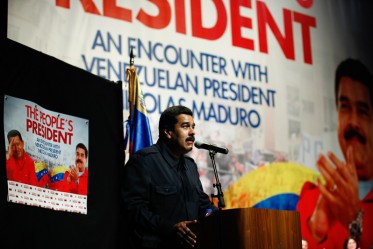U.S. Media Calls for Preventing Venezuela from UN Security Council Seat
Washington Post Slams Venezuela for Electing 'Former Bus Driver'

It’s no secret that the Washington Post editorial page was quite alarmed by Venezuela’s shift to the left under former President Hugo Chavez. The Post–like the rest of elite US media (Extra!, 11/05)–was an unrelenting critic of Chavez’s policies.
Some things haven’t changed.
In a scathing editorial (9/20/14), the Post went after Chavez’s successor Nicolas Maduro, calling him an “economically illiterate former bus driver” because he “rejected the advice of pragmatists” and will continue to pursue policies that are ruining what was “once Latin America’s richest country.”
During the Chavez years, the most important economic story was the rapid gains by the country’s poor (FAIR Blog, 12/13/12); what the Post remembers as the good old days were when prosperity was not so widely shared.
The Post‘s real point is that the United States should do something significant to oppose the human rights abuses under Maduro–most especially the crackdown on anti-government protests earlier this year. The Post cites a Human Rights Watch report to make its case, and the solution was as clear as the editorial headline: “Venezuela Doesn’t Deserve a Seat on the UN Security Council.”
It turns out that Venezuela is a candidate for one of the rotating seats on the Security Council, and the Post thinks it’s time to block that from happening:
Next month Venezuela will stand for a seat on the UN Security Council, where it would be able to advocate for allies such as Syria, Iran and Cuba. Though unopposed, the Maduro government must win the votes of two-thirds of the General Assembly in a secret ballot. The Obama administration could help itself and send a message to Mr. Maduro by rounding up the 65 votes needed to keep Venezuela off the Security Council.
The Post‘s editorial page seems to reserve this kind of thing for Latin American leftists; as we noted last year (FAIR Blog, 6/25/13), the Post called Rafael Correa the “autocratic leader of tiny, impoverished Ecuador,” and recommended the United States use trade deals to punish that country “to demonstrate that Yanqui-baiting has its price.”
But if the Post‘s argument is that human rights abusers should be blocked from the Security Council, then one might assume the paper has made the same case against, let’s say, Saudi Arabia. That country was up for a spot last year; it surprised many observers by rejecting the position, and Jordan, another US-allied monarchy, took its place (Reuters, 12/6/13).
Both of those countries have records worth condemnation, if the Post were really interested in such matters. According to Human Rights Watch World Report 2014, Jordanian law “criminalizes speech deemed critical of the king” and other government officials, its penal code offers “reduced sentences for perpetrators of ‘honor crimes,'” and police torture remains a serious problem.
Saudi Arabia’s deplorable record is probably better known; it’s been in the news recently because the Islamic State’s gruesome beheading videos are a reminder that the Saudi government still considers that to be an acceptable form of punishment; the UN (9/9/14) reports that at least eight people were beheaded in August “for nonviolent crimes including drug-smuggling and sorcery. Other offenses resulting in beheading have reportedly included adultery and apostasy.”
Did those countries’ deplorable human rights records prompt the Post to call for preventing them from a seat on the UN Security Council? Evidently concern for human rights is more important when the country in question is an Official Enemy, the kind of place where some lowly bus driver can be elected president.
P.S. The Post published a letter (9/24/14) from the charge d’affaires of the Venezuelan embassy, which noted that “Venezuelans are proud to belong to a democracy that allows former blue-collar workers to rise to the top.”


